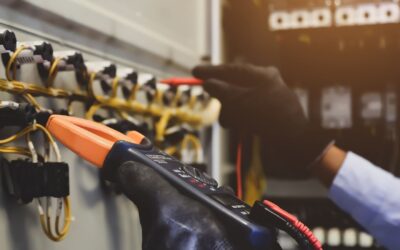Our family opted to live in a home built in 1901. We understand first hand that living in an older home comes with its own set of quirks. Creaky floors, old pipes, or little to no insulation are pretty harmless, but other issues in old houses can be quite dangerous. Things like lead paint, asbestos, and electrical wiring problems can all cause some major headaches. To keep yourself and your family safe from these dangers, you don’t need to move out of your gorgeous old home, you just have to do some work. We suggest you hire an electrical inspector to check out suspicious issues, request quotes from at least three electrical contractors, and then hire a licensed, insured electrician to help get your old home up to date. Here are some common electrical concerns for older homes:
Old Wiring
In houses that are over 40 to 50 years old, the wiring may need to be replaced. This is for your safety as well as the efficiency at which your electronics and appliances can run. In houses built in or before the 1940s, the wiring may have become corroded. This can make it dangerous and cause minor problems like little electrical shocks, or big problems like major shocks and even house fires. Old wiring is also not equipped to handle the capacity that most of your electronics and appliances need today. There are fewer electrical outlets for one, and each of these outlets cannot handle as much as newer electrical systems can.
No Grounding
Current electrical outlets are grounded, which means they protect you from potential electric shock. Grounded outlets are outlets that have two vertical slits of different sizes and one round hole on the bottom. Each of these holes runs to a different part of your electric service panel or circuit breaker. The grounded holes, the bottom hole, and one of the slits act as a safety net in that if an electrical surge over a certain wattage they will signal the circuit breaker to cut off. In Bexar County, we run into this quite a bit where you might not find grounded outlets in many of the older homes. This means that there is no control over the amount of electricity that can flow through the outlet except for the capacity that the wiring can handle. In the event of an electric surge, the outlet could pop with a large electric shock, and potentially catch fire. Grounded outlets are required for any appliances that are encased in metal, such as your kitchen appliances, washer and dryer, and computer equipment. In order to use and maintain modern appliances in an old house, the outlets will likely need to be rewired to keep you and your electronics safe. GFI outlets are your friend this will also give you an opportunity to consider all or select SMART outlets and switches throughout your home for safety and security. For old houses, it is better to be safe than sorry. Get your home inspected by a good electrician and strongly consider having the entire house rewired. It can be a time-consuming and expensive process, but the alternative rewards outweigh the risks for your and your family. Old pipes may burst and make a mess, but you could lose your home to a fire, or be injured or worse, due to old and faulty wiring. It is better to make safe decisions for yourself, your family, and your beautiful old house, and get it the work it needs.



